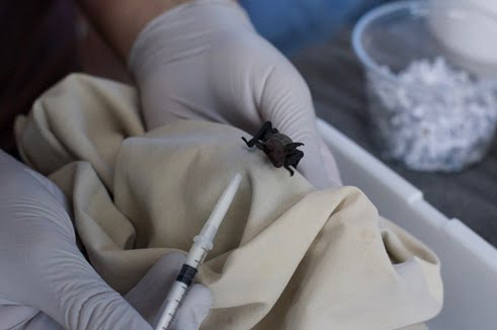Help us help wildlife

What is Wildlife Rehabilitation?
It is the care of injured, sick or orphaned wildlife by trained state-appointed volunteers with the goal of releasing that wildlife back into the wild.

Who can Rehabilitate Wildlife?
In the state of Connecticut, only those possessing a state custodial permit are allowed to temporarily keep recuperating animals. An additional federal permit is required to rehabilitate most wild birds.
How to Become a Wildlife Rehabilitator:
Submit a completed application form to the CT State Department of Energy and Environmental Protection (DEEP) Wildlife Division.
Volunteer with a state-appointed rehabilitator for a minimum of 40 hours.
Complete and submit a Wildlife Rehabilitation Statement of Apprenticeship form. The Apprenticeship form is signed by the applicant and the sponsor, to account for the hours the applicant has spent with the state-appointed rehabilitator.
Obtain a statement of veterinary support which affirms that you have a veterinarian willing to advise and assist you and submit it with your completed application*.
*Subject to additional requirements. Consult the DEEP regarding current requirements and policies.
Attend the DEEP and CWRA training class and pass the DEEP certification exam.
Are Rehabilitators Paid?
Although appointed by the state, the rehabilitator’s efforts are fully voluntary. Rehabilitators are neither paid nor reimbursed for their expenses or time. Donations may be accepted, however.
What is a Transporter?
Often, the animal in need is too far from the appropriate Rehabilitator for the job, or the Rehabilitator is on too tight of a schedule to make the drive him/her self. Having volunteers on-hand to “bridge the gap” is not only needed, but can be a life-saver (get the animal help a.s.a.p.). Transporting also helps introduce those interested in becoming Rehabilitators to those who are experienced.
Do I need a license?
Only a driver’s license is needed, but having a rehabilitation license is helpful.
How do I get started?
Contact us by filling out the form below. Tell us if you are interested in becoming a transporter and attend one of our meetings for a light training session.
How are Rehabilitators funded?
Although appointed by the state, the rehabilitator’s efforts are fully voluntary. Rehabilitators are neither paid nor reimbursed for their expenses or time. Donations may be accepted, however.
The simplest way to help with the emergency care of the animal found is to offer a cash donation to the Rehabilitator that assists you.
Store cards are a fun way to gift food or other supplies without giving cash. Some popular places we shop for supplies are: Chris’s Squirrels And More, Stop-and-Shop, Home Depot, PetSmart and more.
Online donations can be accepted by rehabilitators if they have chosen to sign up with a vendor like PayPal, Go Fund Me, etc. The funds are used for species-specific infant formula, baby blankets/fleece, heat pads, habitats (aviaries, soft-release pens, etc.), x-rays, medical care and more. To donate to the CWRA, you can do so here.
For those who would rather mail a check, you may request the mailing address of the licensed volunteer that assists you.
